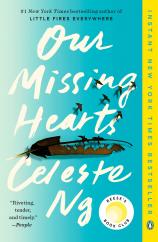Reading Group Guide
Discussion Questions
Our Missing Hearts

1. The novel takes place in a world that “isn’t exactly our world, but it isn’t not ours, either,” writes Ng in the Author’s Note (327). What elements of the novel’s setting align with your understanding and experience of the events of the 21st century thus far? How close do you think we are to a society like that described in the novel?
2. There are two epigraphs that open the book --- one (real) poem by Anna Akhmatova, and one (fictional) excerpt from PACT literature. How does their juxtaposition set up the invitation to compare reality and imagination, and see our present moment through a historical lens as well as the one devised by Ng for the novel?
3. The connection between literature and protest is powerful in the novel --- from the proliferation and censorship of Margaret’s poetry to the network of librarians caring for the relocated children. Why do you think this form of communication is so resilient against forces and events as big as the Crisis and PACT? How does it inspire individuals and groups in the novel to act?
4. Ethan is originally hired at the university as a linguistics professor, and his obsession with words seeps into his daily habits, such as reading from the dictionary: “His father’s oldest habit: taking words apart like old clocks to show the gears still ticking inside” (18). How does sharing this love of language help Bird in his quest, and ultimately reconnect their family, albeit indirectly, by the end of the novel?
5. Both Bird and Sadie struggle with missing parents, yet their approach to seeking a deeper understanding of their past is vastly different. What about their personalities guide their respective strategies, and why do you think their friendship is so strong?
6. Margaret and Domi’s parting during the Crisis is devastating to them both. Why are they able to restore their friendship once Margaret returns seeking help? What do each of them gain by working together on Margaret’s plan, even beyond the emotional healing of their split?
7. Discuss Margaret’s transformation when she becomes a mother. How is she able to adapt to so many different circumstances --- from her rebellious and resourceful youth to the comfort of her life with Ethan to the purpose driving her life and survival when she goes into hiding? What about Bird’s existence makes her willing to sacrifice it all for the children she tries to honor in her final act?
8. Bird’s trip to and through New York City reveals all the ways, big and small, the city had been reshaped by the current, post-Crisis, PACT-enforcing government. Have you ever been to a familiar place that changed radically over time, or after you yourself had changed radically? What was your experience in encountering its newness, or through new eyes?
9. Although Bird dislikes the name his father gives him, Noah, how does it relate to his mother and father’s names, which have etymological roots in plants and the natural world? What does it mean for him to reclaim the name his mother called him?
10. What is the special allure of the stacks in the university library for Bird and for Ethan? Do all libraries carry the same quality of discovery and comfort, and have you been to a library that held that “mix of dust and leather and melted vanilla ice cream. Warm, like the scent of someone’s skin” (68)?
11. Discuss the chain of events --- political, economic and social --- that accumulate in the Crisis and lead to the eventual formation of PACT. What events, from history close and farther in the past, resemble this trajectory, in the United States and abroad? What is common among those chains of events, real and fictional, that reveal tendencies of the human psychology, the need for power and blame, and the fear of the unknown or unfamiliar?
12. We see several events in the novel --- such as the moment when Margaret leaves the family home --- from two perspectives, Bird’s and his mother’s. How do these two perspectives shape your understanding of the family dynamic, as well as each of their motives to find each other?
13. Which form of storytelling resonated with you most in the novel, or in life in general: written or oral? How are they each used in ways to preserve the truth of lived experience when history or other dominant powers tried to erase them --- such as the missing children, and Margaret herself?
Our Missing Hearts
- Publication Date: August 22, 2023
- Genres: Fiction
- Paperback: 352 pages
- Publisher: Penguin Books
- ISBN-10: 0593492668
- ISBN-13: 9780593492666







